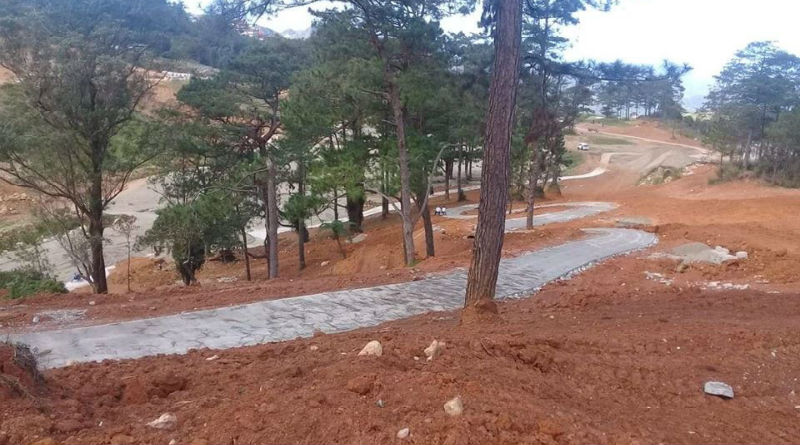BAGUIO CITY – The 7th Division of the Court of Appeals (CA) ordered the Cordillera office of the Environment Management Bureau (EMB-CAR and the Sta. Lucia Realty Development Corporation to file their separate comments on a pending petition that assailed the decision of a local court that lifted the Temporary Environment Protection Order (TEPO) issued against the golf course project of the developer due to unresolved land issues.
In a resolution dated September 19, 2019, the CA’s 7th Division composed of Associate Justice Apolinario D. Brucelas, Jr. and members Associate Justices Nena G. Antonio-Valenzuela and Luis P. Acosta stated that without necessarily giving due course to the present petition, the court directed the public and private respondents to file comment thereon within 10 days from notice.
The CA stipulated in the promulgated resolution that the comment to be filed by the public and private respondents with the prescribed period should not be a motion to dismiss.
On the other hand, the CA gave the petitioners, heirs of Tunged, 5 days from receipt of the required comment to file reply thereto.
The CA mandated the involved parties to promptly notify the court of any other cases or proceedings involving the same parties and issues pending in the appellate court or in other courts within five days from knowledge thereof pursuant to the directive issued by the Supreme Court.
The CA also directed the counsel for the petitioners, lawyer Noel Magalgalit, to furnish the Office of the Solicitor-General as counsel to EMB-CAR a copy of the instant petition with annexes and submit proof of service thereof within 5 days from notice.
Within the same 5-day period, the CA stated that petitioners are required to remit payment for the sheriff’s trust fund in the amount of P1,000 pursuant to SC Resolution dated January 10, 2018.
Earlier, the heirs of Tunged petitioned the CA to declare the ruling of the Regional Trial Court (RTC) Branch 5 in Baguio City lifting the earlier Temporary Environment Protection Order (TEPO) issued against the Sta. Lucia golf project as null and void for having been issued without or in excess of jurisdiction.
In an 18-page petition for certiorari, Magalgalit, counsel for the heirs of Tunged, argued that RTC Branch 5 Judge Maria Ligaya Itliong-Rivera allegedly acted without or in excess of jurisdiction in recalling the TEPO she earlier issued against the golf course developer and asserted that petitioners are entitled to the permanency of the TEPO considering the unresolved issues on their claims over the lands being occupied by the developer.
The petition claimed that the judge, in lifting the TEPO, reportedly acted with grave abuse of discretion amounting to lack of exercise of jurisdiction considering that there was grave abuse of discretion justifying the issuance of the writ of certiorari as there was alleged capricious and whimsical exercise of judgement as is equivalent to lack of jurisdiction.
Further, the petitioners also accused the judge of alleged manifest bias and partiality when she recalled the TEPO and that glaring is the malicious grant of the TEPO only to be withdrawn without any factual and legal grounds, thus, arousing suspicion.
In their previous petition that resulted to the issuance of the TEPO by the judge, the heirs of Tunged alleged that the private defendants, Sta. Lucia Realty and Development, Inc., in causing the summary demolition, bulldozing, excavations, flattening of the subject land causing the clearing, damage and destruction of their plants and resources, including the sustainable traditional resource rights, the rights against unlawful or unauthorized intrusion and the right against usurpation, are violative of their rights protected under the provisions of the Indigenous Peoples Rights Act.
The petitioners asserted that the act of Sta. Lucia in failing to comply with the provisions of the environmental compliance certificate or lack of the same for its project was likewise violative of Presidential Decree 1586 or the Act Establishing an Environmental Impact Statement System including other environmental laws, rules and regulations and for their purposes considering the irreparable danger to the environment posed by the project.
The petitioned explained that the aforesaid reasons coupled with pieces of evidence that entitles them for the issuance of the TEPO and the permanency of the TEPO.
In the issuance of the TEPO, the court earlier noted that in the investigation report of the Department of Environment and Natural Resources (DENR), it was shown that the developer has no permit to reportedly cut pine trees considering that what it possessed that time is a mayor’s clearance to cut 35 pine trees but which clearance is not equivalent to a permit.
By HENT













